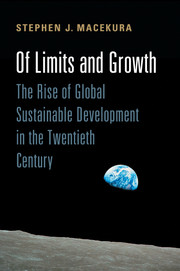Book contents
- Frontmatter
- Contents
- List of Illustrations
- Acknowledgments
- Introduction: NGOs and the Origins of “Sustainable Development”
- PART ONE ORIGINS
- 1 The Rise of International Conservation and Postwar Development
- 2 Parks and Poverty in Africa: Conservation, Decolonization, and Development
- 3 “The World's Most Dangerous Political Issue”: The 1972 Stockholm Conference and the Politics of Environmental Protection
- PART TWO REFORMS
- PART THREE PERSISTENT PROBLEMS
- Conclusion: The Growth and Limits of NGOs
- Archives
- Index
1 - The Rise of International Conservation and Postwar Development
from PART ONE - ORIGINS
Published online by Cambridge University Press: 05 July 2015
- Frontmatter
- Contents
- List of Illustrations
- Acknowledgments
- Introduction: NGOs and the Origins of “Sustainable Development”
- PART ONE ORIGINS
- 1 The Rise of International Conservation and Postwar Development
- 2 Parks and Poverty in Africa: Conservation, Decolonization, and Development
- 3 “The World's Most Dangerous Political Issue”: The 1972 Stockholm Conference and the Politics of Environmental Protection
- PART TWO REFORMS
- PART THREE PERSISTENT PROBLEMS
- Conclusion: The Growth and Limits of NGOs
- Archives
- Index
Summary
In the early months of 1948, Julian Huxley felt optimistic. As the most devastating war in human history faded from view, the reconstruction of his native Britain slowly took shape. At the same time, the new international organization he had been selected to lead, the United Nations Education, Social, and Cultural Organization (UNESCO), was getting off the ground. A highly regarded scientist, writer, and internationalist, Huxley held high hopes for UNESCO. He believed his new organization would usher in an era of more harmonious relations between different nations, cultures, and individuals. World War II had shown humankind at its most destructive; now was a time for the world to create new institutions that would revive common bonds between disparate societies, bring advances in science to bear upon pressing social and economic problems, and link together the world's brightest minds in the hopes of crafting a lasting peace. UNESCO, Huxley wrote, would “help the peoples of the world to mutual understanding and to a realization of the common humanity and common tasks which they share, as opposed to the nationalisms which too often tend to isolate and separate them.” Huxley dedicated the better part of his postwar career to bringing about just such an understanding.
Amid all the social problems that Huxley hoped to address with UNESCO was an issue close to his heart but one that found only a handful of supporters worldwide in 1948: the devastation of natural flora and fauna. The world wars not only shattered many illusions about the relationship between human societies. They also called into question the relationship between humankind and nature. War alters the nonhuman environment in substantial ways, a fact made all the more apparent by the particular destructiveness of the technologies used during World War II. To Huxley, the war's impact on the environment represented the culmination of longer trends of destruction, despoliation, and exploitation. Since the late nineteenth century, rapid economic and social development in the United States, Europe, and Japan had spurred wide-scale environmental change. Industrialization, urbanization, increasing use of natural resources, and rapid worldwide population growth all threatened the natural world.
- Type
- Chapter
- Information
- Of Limits and GrowthThe Rise of Global Sustainable Development in the Twentieth Century, pp. 17 - 53Publisher: Cambridge University PressPrint publication year: 2015

